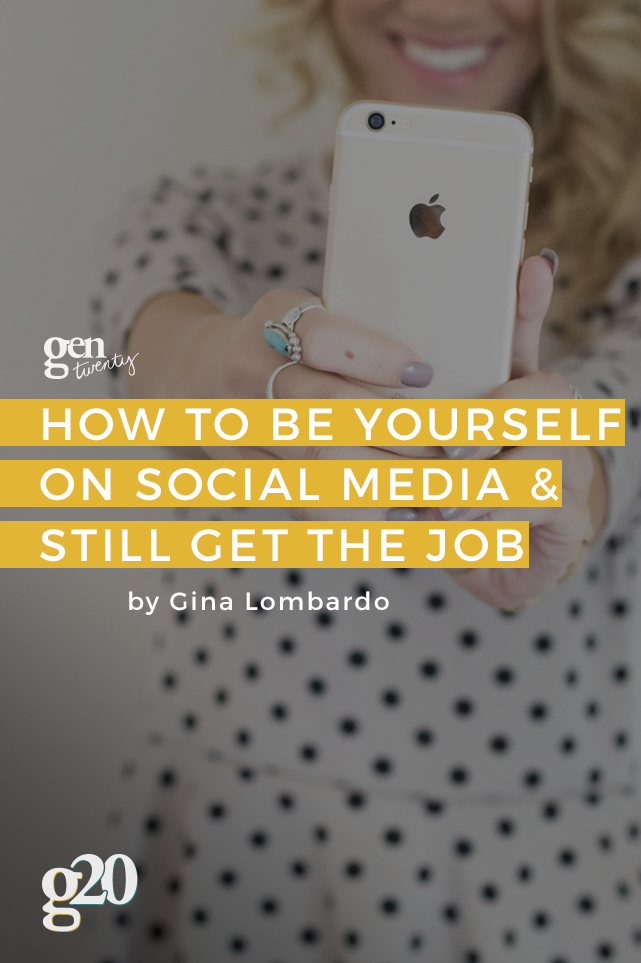
How many of your Facebook friends have recently changed their name, made the profile picture a cartoon, or fully deactivated their account as they began interviews for their next career move? I bet you can count at least three.
Maybe you’ve even done it yourself. When it comes to separating personal from professional, we tend to err on the side of caution. Most of us don’t want anything to jeopardize the hard work we’ve put into our careers. You really don’t want those pictures from Spring Break 2009 that you thoughtlessly uploaded to Facebook to be the first thing HR sees when they Google your name, do you? Probably not.
What you want them to see is the projects you’ve worked on, how you spend some of your vacation volunteering with Habitat for Humanity, and your love of your home state’s football team.
That said, how exactly can you be yourself on public accounts?
1. Choose your photos wisely.
Once a photo is out on social media, you have no control over who can access (or save it) and how they will use it in the future. As a general rule, it’s a good idea to select photos that you would be okay with both your mom and your boss seeing should they check in on you.
This might vary depending on your mom and your boss, so follow your instincts! As twenty-somethings having a drink in hand, or being at the bar is fine, but documenting the last shot you took is probably less than necessary — a little common sense goes a long way.
Public Instagram and Twitter profiles are fabulous because they prove you’ve got nothing to hide — you’re both fun and responsible!
2. Handle controversy with tact.
Facebook and Twitter can get political, and often deal with issues of social justice. Having strong opinions and articulating them well are wonderful attributes to develop as a twenty-something. It shows you’re informed and engaged.
If you post about a hot topic, write your status or tweet professionally, meaning without slang or expletives. When someone comments with their dissenting opinion, try your best to remain civil.
You can even take that as an opportunity to elaborate on your views in a way which may help other friends in the comment section see your point! This shows that you can communicate effectively and are educated regarding current events.
3. Avoid posts dedicated to complaints.
Social media is often used as a platform to vent about our problems or negative experiences on a particular day. While getting our feelings out in the open is essential to a healthy mentality, a status update is probably not the most ideal way to deal with anger and frustration. Negative posts tend to just breed more negativity, people comment with similar issues, and everyone involved gets annoyed — call a friend or journal about the experience instead.
This is not to say you can’t be transparent, in fact, transparency and honesty is encouraged! Instead of being a downer, put a positive spin on your bad day and inspire those who follow you to do the same.
Social media is a great way to have a positive impact. You can post compliments, inspirational articles, or congratulatory messages to your successful friends. That seems like a better use of an update!
4. Monitor your comments and followers!
You are the CEO of your social media accounts, so if you find inappropriate comments, or anything that generally makes you uncomfortable, you have the right to remove the comment and/or block the user, depending on the situation.
This can happen to anyone, although people with larger followings deal with this more than those of us with fewer followers. Use your judgement, and allow your page to be one where people can feel comfortable and safe to interact with not only you, but also with each other.
5. Embrace who you are.
Social media is an amazing way to allow people all around the world learn about you. Post your outfit of the day, your drawing or poem, the song you wrote, the research you conducted, or anything else you love.
Not everyone will love everything, but getting positive and negative feedback are both incredibly important to grow in both your career and your life outside of work. Presenting yourself in an authentic way online means there will be fewer surprises when people meet you in “real life.”
Read this next: How To Stop Being Afraid to Express Your Personality
For daily doses of inspiration, and connections with fellow twenty-somethings make sure you’re following @Gen_Twenty on Twitter and @GenTwenty on Instagram!
Follow GENTWENTY | Career, Life and Finance Tips for Twenty-Somethings’s board CAREER TIPS on Pinterest.
